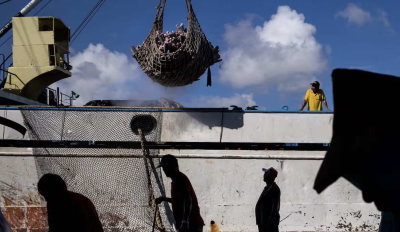
For Immediate Release: February 10th, 2025
Contact: Julie Blust julieblust [at] globallaborjustice.org () 215-713-6777
Seafood Labor Activists Demand MSC Acknowledge Its Role in Enabling Labor Abuse
Washington D.C. – Global Labor Justice (GLJ) and allies in the Seafood Working Group (SWG) today issued an open letter to the Marine Stewardship Council (MSC), calling on the certification body “to take responsibility for the role of its social policies and processes in enabling the abuse of workers in certified fisheries, and its attendant role in instances of certifying fish produced under conditions of labor exploitation.”
The letter, signed by several SWG members—including Global Labor Justice (GLJ), International Transport Workers’ Federation (ITF), Humanity United, Freedom Fund, and Greenpeace US cited rampant labor abuse in the hazardous seafood industry:
“The fishing sector is rife with severe labor abuses, with at least 128,000 fishers subjected to forced labor. The industry is also extremely dangerous, with over 100,000 fishers losing their lives each year due to hazardous working conditions. Many fishers face grueling hours, withheld wages, abusive conditions, and extreme isolation, often with little to no protections or recourse. Despite these alarming conditions, seafood from such fleets continues to enter European and U.S. markets. This systemic disregard for fishers' labor rights in the seafood sector is unacceptable and must urgently be addressed.”
Due to increasing attention to the exploitation of migrant fishers and recent reports of forced labor incidents in MSC-certified fisheries, the MSC is facing scrutiny for failing to take responsibility for how its social policies and processes contribute to unchecked labor abuse in certified fisheries. Rather than accepting its role in certifying fish produced under exploitative labor conditions, the MSC is distancing itself from responsibility.
Member organizations within the SWG have called on the MSC to be transparent, ensuring that all stakeholders—including consumers—understand that the MSC ecolabel does not, and cannot, safeguard against labor rights violations. Additionally, the letter demands that MSC must inform companies that relying solely on the MSC ecolabel for sourcing decisions without considering labor standards enables labor exploitation of workers and exposes companies to significant reputational risks. As the MSC does not provide adequate assurance for the protection of labor rights, the letter recommends that the MSC clearly acknowledge the label’s limitations, actively and publicly endorse legally binding solutions to effectively protect fishers’ labor rights, and promote other mechanisms that allow workers to assert their collective agency to monitor, enforce, and remedy labor rights violations.
The MSC’s business model relies on the fishing industry. With 88.7% of its revenue coming from royalties on products that carry its logo, it has an embedded financial interest in keeping major fisheries in its program, even where there is evidence of forced labor without meaningful or credible efforts to prevent and remedy it. Rather than guaranteeing high labor standards, the MSC logo provides false cover– since companies know they can get the MSC’s logo on their products without addressing labor violations, they have less incentive to do so.
###
Global Labor Justice –(GLJ) is a non-governmental organization that works transnationally to advance policies and laws that protect decent work; to strengthen freedom of association and workers’ ability to advocate for their rights; and to hold corporations accountable for labor rights violations in their supply chains.
The Seafood Working Group (SWG) is a global coalition of human rights, labor, and environmental organizations that work together to develop and advocate for effective government policies and industry actions to end the related problems of labor exploitation, illegal fishing, and overfishing in the international seafood trade.


